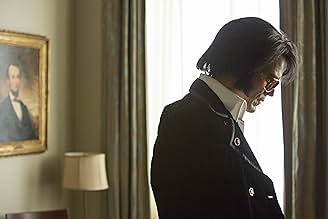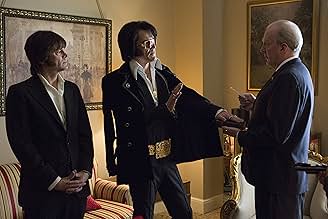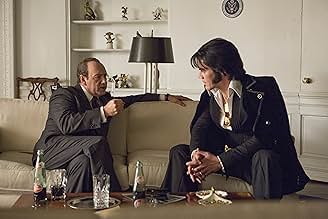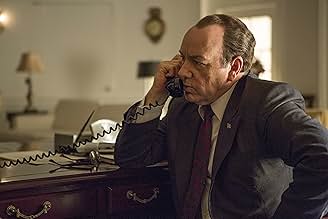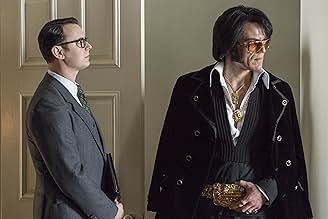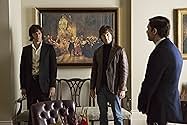AVALIAÇÃO DA IMDb
6,3/10
15 mil
SUA AVALIAÇÃO
Adicionar um enredo no seu idiomaThe untold true story behind the meeting between Elvis Presley, the King of Rock 'n Roll, and President Richard Nixon, resulting in this revealing, yet humorous moment immortalized in the mo... Ler tudoThe untold true story behind the meeting between Elvis Presley, the King of Rock 'n Roll, and President Richard Nixon, resulting in this revealing, yet humorous moment immortalized in the most requested photograph in the National Archives.The untold true story behind the meeting between Elvis Presley, the King of Rock 'n Roll, and President Richard Nixon, resulting in this revealing, yet humorous moment immortalized in the most requested photograph in the National Archives.
- Direção
- Roteiristas
- Artistas
- Prêmios
- 2 vitórias e 4 indicações no total
Skye Peters
- Stewardess #3
- (as Skye Forsyth-Peters)
- Direção
- Roteiristas
- Elenco e equipe completos
- Produção, bilheteria e muito mais no IMDbPro
Resumo
Reviewers say 'Elvis & Nixon' is a historical comedy-drama highlighting the unique meeting of Elvis Presley and President Richard Nixon. Praised for performances, especially Michael Shannon and Kevin Spacey, though some find Shannon's portrayal less convincing. The film blends humor with poignancy, though critics debate its depth and ambition. The supporting cast is well-received, making it an entertaining, albeit minor, biopic.
Avaliações em destaque
Elvis & Nixon very much relies on the performances of Kevin Spacey and Michael Shannon, and thrives on what they bring to the eventual meeting between Elvis Presley and Richard Nixon. The movie is based on a true story that's better documented than is suggested here. Making Elvis & Nixon fanciful and fabricated in spite of how unusual this event actually was. Which is fine, because most biopics and fact-based dramas exist on creative licence. Although this is a movie that could have been equally successful had more of the facts been more closely adhered to in the script.
What matters, however, is how interesting and appealing Spacey and Shannon make the film's central characters. Although we find a way into their respective worlds by way of Colin Hanks' "Bud Krogh" and Alex Pettyfer's "Jerry Schilling." Schilling in particular, whose fingerprints are evident throughout the movie ("me and a guy named Elvis" is a line of dialogue at one point," this being the title of Schilling's autobiography) and who acts almost like an audience surrogate.
Schilling, who we first encounter working at Paramount Studios, is encouraged back "in" with Elvis as we are taken on a journey to the White House that's foreshadowed in our first glimpse of the man, himself. Watching Dr. Strangelove on one of his three televisions in a nicely recreated Graceland television room. But this isn't just a reference to one of Elvis's favourite movies, the scene from Kubrick's film that's used here foreshadows the nature and tone of his meeting with Nixon. No fighting in the War Room? How about karate in the Oval Office?!
Along the way, Shannon, who doesn't resemble Elvis but embodies the role with gestures small and grand, speech patterns, glances and a physicality that's undoubtedly been studied, becomes believable as Elvis. This isn't a caricature. The caricature is what Elvis actually became. Which is appreciated in the way he expresses concerns about his identity to Schilling, and in a touching monologue about his stillborn brother, Jessie Garon.
Shannon finds genuine nuance and pathos in Elvis. Although Liza Johnson's direction doesn't quite allow the excitement and elation of meeting Nixon to be juxtaposed with crushing lows or an indication of how such ultimately manifested itself in Elvis over subsequent years. We see him disappointed when things aren't going his way and when meeting Nixon seems lost at one point, but standing slumped and resigned isn't enough to encourage deeper sympathy for Elvis. Whilst the ultimate irony was missed in failing to depict his own problems with drugs.
As Nixon, Spacey also finds nuance and manages to make the former President larger than life from behind a desk and despite his reservations about meeting Elvis, and just about everything else. He has less to work with than Shannon, but Spacey gets Nixon just right and manages to refrain from caricature whilst exploring amusing traits and mannerisms. Both physical and psychological.
Beyond the two central characters, the screenplay and some variable stock footage encourages political and cultural touch-points that aren't dwelled upon. Although it's clear that Nixon isn't adverse to finding good PR opportunities or impressing his daughters. A trend that crops up throughout the movie, with Elvis using such as a free pass at his convenience. For him, good PR opportunities are also valuable.
In many ways, however, Elvis and Nixon suffer the same issues with loneliness, isolation and concerns about their image. Which is something Elvis is portrayed as being more in touch with than Nixon, who laments about not looking like a Kennedy and tries to boost his ego by asking Krogh if he could take Elvis in a fight. Elvis, on the other hand, is aware of his image and the performance that's required just to be Elvis Presley. Which is something that was also expressed by Michelle Williams' Marilyn Monroe in Simon Curtis' 2011 film, My Week With Marilyn.
By the time Elvis and Nixon eventually meet, both characters have been fully established, and whilst the vignettes along the way are both funny and geared towards comedy, some miss the mark completely. Such as a clandestine meeting between Elvis and Nixon's aides, that hints towards All the Presidents Men but plays more like a parents' meeting. Although Elvis's visit to a doughnut shop that's populated by a streetwise and vocal black clientele shows him comfortable with all walks of life and able to keep his ego in check.
This is in stark contrast to his meeting with Nixon, where Elvis is far from humbled and tries to impress upon the President with bizarre notions and one-upmanship. In one shot, Elvis seems to dwarf Nixon in the way both men are framed. But Spacey plays the President with quick wit and more than a little bemusement at what's in front of him. He sees what see in Elvis. But can't see that he's playing him for his own gain.
Unfortunately, the pacing and editing falters during the final act, with Schilling's personal dilemma of getting home to his girlfriend breaking the meeting up at one point. Whilst Evan Peters and Johnny Knoxville's Dwight Chapin and Sonny West, respectively, linger in thankless roles.
What's also noticeable is a lack of Elvis's music in the film's soundtrack, which is quite good regardless. Although Ed Shearmur's score is transparent and obtrusive at times. But Elvis & Nixon isn't about Elvis and his music. It's about a quest to find something fulfilling in his life. Which is expressed with profound sincerity in the way Michael Shannon plays Elvis. Getting under his skin and contrasting charisma and personality with a pensive nature and moments of uncertainty. It's a warm, affectionate and earnest performance in a movie that's skewed towards comedy, but has an acute understating of not only Elvis and Nixon, but celebrity and politics.
What matters, however, is how interesting and appealing Spacey and Shannon make the film's central characters. Although we find a way into their respective worlds by way of Colin Hanks' "Bud Krogh" and Alex Pettyfer's "Jerry Schilling." Schilling in particular, whose fingerprints are evident throughout the movie ("me and a guy named Elvis" is a line of dialogue at one point," this being the title of Schilling's autobiography) and who acts almost like an audience surrogate.
Schilling, who we first encounter working at Paramount Studios, is encouraged back "in" with Elvis as we are taken on a journey to the White House that's foreshadowed in our first glimpse of the man, himself. Watching Dr. Strangelove on one of his three televisions in a nicely recreated Graceland television room. But this isn't just a reference to one of Elvis's favourite movies, the scene from Kubrick's film that's used here foreshadows the nature and tone of his meeting with Nixon. No fighting in the War Room? How about karate in the Oval Office?!
Along the way, Shannon, who doesn't resemble Elvis but embodies the role with gestures small and grand, speech patterns, glances and a physicality that's undoubtedly been studied, becomes believable as Elvis. This isn't a caricature. The caricature is what Elvis actually became. Which is appreciated in the way he expresses concerns about his identity to Schilling, and in a touching monologue about his stillborn brother, Jessie Garon.
Shannon finds genuine nuance and pathos in Elvis. Although Liza Johnson's direction doesn't quite allow the excitement and elation of meeting Nixon to be juxtaposed with crushing lows or an indication of how such ultimately manifested itself in Elvis over subsequent years. We see him disappointed when things aren't going his way and when meeting Nixon seems lost at one point, but standing slumped and resigned isn't enough to encourage deeper sympathy for Elvis. Whilst the ultimate irony was missed in failing to depict his own problems with drugs.
As Nixon, Spacey also finds nuance and manages to make the former President larger than life from behind a desk and despite his reservations about meeting Elvis, and just about everything else. He has less to work with than Shannon, but Spacey gets Nixon just right and manages to refrain from caricature whilst exploring amusing traits and mannerisms. Both physical and psychological.
Beyond the two central characters, the screenplay and some variable stock footage encourages political and cultural touch-points that aren't dwelled upon. Although it's clear that Nixon isn't adverse to finding good PR opportunities or impressing his daughters. A trend that crops up throughout the movie, with Elvis using such as a free pass at his convenience. For him, good PR opportunities are also valuable.
In many ways, however, Elvis and Nixon suffer the same issues with loneliness, isolation and concerns about their image. Which is something Elvis is portrayed as being more in touch with than Nixon, who laments about not looking like a Kennedy and tries to boost his ego by asking Krogh if he could take Elvis in a fight. Elvis, on the other hand, is aware of his image and the performance that's required just to be Elvis Presley. Which is something that was also expressed by Michelle Williams' Marilyn Monroe in Simon Curtis' 2011 film, My Week With Marilyn.
By the time Elvis and Nixon eventually meet, both characters have been fully established, and whilst the vignettes along the way are both funny and geared towards comedy, some miss the mark completely. Such as a clandestine meeting between Elvis and Nixon's aides, that hints towards All the Presidents Men but plays more like a parents' meeting. Although Elvis's visit to a doughnut shop that's populated by a streetwise and vocal black clientele shows him comfortable with all walks of life and able to keep his ego in check.
This is in stark contrast to his meeting with Nixon, where Elvis is far from humbled and tries to impress upon the President with bizarre notions and one-upmanship. In one shot, Elvis seems to dwarf Nixon in the way both men are framed. But Spacey plays the President with quick wit and more than a little bemusement at what's in front of him. He sees what see in Elvis. But can't see that he's playing him for his own gain.
Unfortunately, the pacing and editing falters during the final act, with Schilling's personal dilemma of getting home to his girlfriend breaking the meeting up at one point. Whilst Evan Peters and Johnny Knoxville's Dwight Chapin and Sonny West, respectively, linger in thankless roles.
What's also noticeable is a lack of Elvis's music in the film's soundtrack, which is quite good regardless. Although Ed Shearmur's score is transparent and obtrusive at times. But Elvis & Nixon isn't about Elvis and his music. It's about a quest to find something fulfilling in his life. Which is expressed with profound sincerity in the way Michael Shannon plays Elvis. Getting under his skin and contrasting charisma and personality with a pensive nature and moments of uncertainty. It's a warm, affectionate and earnest performance in a movie that's skewed towards comedy, but has an acute understating of not only Elvis and Nixon, but celebrity and politics.
I've been waiting to see this movie for a year or longer. Eric Bana was originally supposed to play Elvis, and he would have been a much better fit than Michael Shannon. Michael doesn't look anything like Elvis, and he didn't show any charisma in his performance. Elvis is one of the best looking and most charismatic men to ever live, so it was painful to see this casting train wreck. There are several scenes in the original Elvis Meets Nixon that were left out of this remake: the beginning airport scene where the airline clerk asked Elvis for payment of his ticket and he says "can you send the bill to the Colonel as he has no cash or check book, the scene where he was taken off the plane for carrying a pistol, and the taxicab scene when a Michael Jackson song was playing on the radio. Those were just 3 missed opportunities to spice the movie up. The only redeeming thing about this movie was the convincing performance that Kevin Spacey gave. He looked and played that part to the hilt. I really wanted to love this movie, and I am so disappointed that I could not do so.
It's December 1970. Entertainer Elvis Presley (Michael Shannon) is distressed about the effects of drugs and the counter-culture on America. He recruits his friend Jerry Schilling (Alex Pettyfer) on a mission to be named Federal-Agent-At-Large to go undercover. They show up at a White House gate to get a meeting with President Richard Nixon (Kevin Spacey). Nixon refuses at first despite his aides Egil Krogh (Colin Hanks) and Dwight Chapin (Evan Peters)'s pleas. Jerry has the idea to get Nixon through his daughter Julie.
This movie is mildly amusing. The history is possible. The performances of Shannon and Spacey are intriguing. Shannon may not be completely correct but he brings a self-possessed actualized personality to the role. The movie plays it mostly straight. There aren't any big surprises but I do like Nixon's initial refusal. There are plenty of light moments which leaves the movie feeling lightly fun. It would be more compelling to go overboard with the broad comedy or go darker. This ends up existing in the milky white toast middle.
This movie is mildly amusing. The history is possible. The performances of Shannon and Spacey are intriguing. Shannon may not be completely correct but he brings a self-possessed actualized personality to the role. The movie plays it mostly straight. There aren't any big surprises but I do like Nixon's initial refusal. There are plenty of light moments which leaves the movie feeling lightly fun. It would be more compelling to go overboard with the broad comedy or go darker. This ends up existing in the milky white toast middle.
I really hadn't heard much about this film, and certainly wasn't going in expecting an Elvis impersonator or someone looking exactly like President Nixon. Wasn't disappointed there in regard to Elvis. Michael Shannon didn't look much like Elvis, but he did have the soft voice, the southern charm thing going for him. He did a fine job with this role. And actually, Kevin Spacey did manage to look a great deal like Nixon. Sounded like him, too. Everyone in this movie did a good job, and worked the roles of those involved in this slightly absurd moment in history to justice. So, I guess what I was, was really pleasantly surprised by this picture. Totally enjoyed myself with lots of laughs and a few poignant moments. I dimly remember this episode with Elvis showing up at the White House wanting to become an FBI Agent Abroad. With a badge. And at the time I recall thinking that only Elvis could be that naïve and yet that brash at the same time. In all honesty, this picture managed to show all of that, and more. What a colorful moment in American history all wrapped up in this fine little film.
This film almost passed me by until I stumbled across it on Amazon Prime. From the 'in period' opening credits to the bad wigs to the bro's in the coffee shop the cheese is strong and thick, but it's a very enjoyable film whichever way you approach it. Michael Shannon (who was completely new to me) neither looks nor sounds like Elvis but somehow fills the role very well, exposing a rather sad, isolated individual who just wants to be noticed for something other than being 'The King'. But the film is stolen IMO by Kevin Spacey, who captures ol' Tricky Dicky perfectly - the growling voice, the stoop, the hand gestures. Not only that, but he injects a wry wit to his part which goes a long way toward lifting this movie out of a dullness which threatened to engulf it at several points. I could easily watch it again.
Você sabia?
- CuriosidadesBased on a true story. In December 1970, Elvis Presley met President Richard Nixon, who appointed Presley as an honorary DEA agent.
- Erros de gravaçãoIn the Oval Office: The Dr Pepper bottles logos are ten years ahead of their time.
- ConexõesFeatured in Vecherniy Urgant: Olga Pogodina/Andrey Chernyshov (2016)
- Trilhas sonorasHold On I'm Coming
Written by Isaac Hayes & David Porter (as Dave Porter)
Performed by Sam & Dave
Courtesy of Atlantic Recording Corp.
By Arrangement with Warner Music Group Film & TV Licensing
Principais escolhas
Faça login para avaliar e ver a lista de recomendações personalizadas
- How long is Elvis & Nixon?Fornecido pela Alexa
Detalhes
- Data de lançamento
- Países de origem
- Centrais de atendimento oficiais
- Idiomas
- Também conhecido como
- Elvis and Nixon
- Locações de filme
- Empresas de produção
- Consulte mais créditos da empresa na IMDbPro
Bilheteria
- Faturamento bruto nos EUA e Canadá
- US$ 1.055.287
- Fim de semana de estreia nos EUA e Canadá
- US$ 466.447
- 24 de abr. de 2016
- Faturamento bruto mundial
- US$ 1.798.432
- Tempo de duração
- 1 h 26 min(86 min)
- Cor
- Proporção
- 2.35 : 1
Contribua para esta página
Sugerir uma alteração ou adicionar conteúdo ausente







